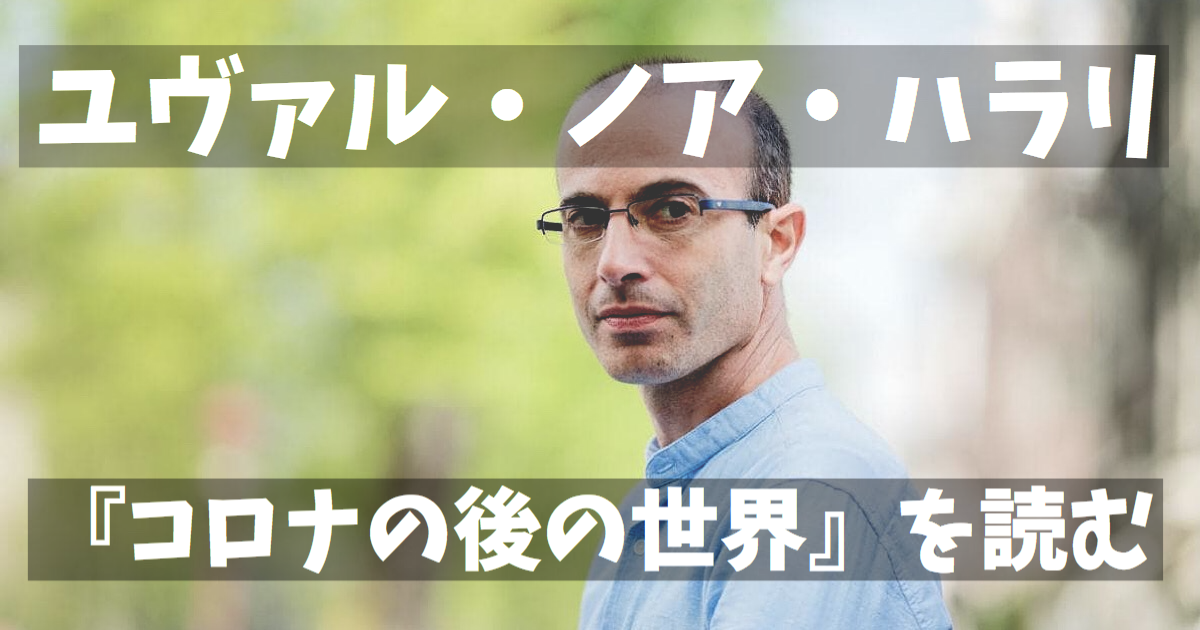[1] This storm will pass. But the choices we make now could change our lives for years to come.
[2] Humankind is now facing a global crisis. Perhaps the biggest crisis of our generation. The decisions people and governments take in the next few weeks will probably shape the world for years to come. [3] They will shape not just our healthcare systems but also our economy, politics and culture. We must act quickly and decisively. We should also take into account the long-term consequences of our actions. [4] When choosing between alternatives, we should ask ourselves not only how to overcome the immediate threat, but also what kind of world we will inhabit once the storm passes. Yes, the storm will pass, humankind will survive, most of us will still be alive — but we will inhabit a different world.
[5] Many short-term emergency measures will become a fixture of life. That is the nature of emergencies. They fast-forward historical processes. Decisions that in normal times could take years of deliberation are passed in a matter of hours. [6] Immature and even dangerous technologies are pressed into service, because the risks of doing nothing are bigger. Entire countries serve as guinea-pigs in large-scale social experiments. [7] What happens when everybody works from home and communicates only at a distance? What happens when entire schools and universities go online? [8] In normal times, governments, businesses and educational boards would never agree to conduct such experiments. But these aren’t normal times.
[9] In this time of crisis, we face two particularly important choices. The first is between totalitarian surveillance and citizen empowerment. The second is between nationalist isolation and global solidarity.
Yuval Noah Harari: the world after coronavirus | Free to read in Financial Times
Contents
[1] を読む
Ⓢ This storm Ⓥ will pass. But Ⓢ the choices Ⓥ could change Ⓞ our lives (for years to come).
【訳】この嵐はいずれ過ぎ去るだろう。しかし,私達が今,行う選択というものが,今後何年にも渡って,私達の生活を変えてしまうだろう。
- storm 【名】嵐
- pass 【動】通り過ぎる
- choice 【名】選択 make a choice 直後の we make は関係代名詞節
- years to come 【名】今後数年 (to come は不定詞の形容詞的用法 )
[2] を読む
Ⓢ Humankind Ⓥ is now facing Ⓞ a global crisis. {同格 (Perhaps) the biggest crisis of our generation.} Ⓢ The decisions Ⓥ will (probably) Ⓥ shape Ⓞ the world (for years to come).
【訳】人類は今,世界的な危機に直面している。もしかすると,私達の世代で最大の危機かもしれない。これから数週間のあいだに人々や政府が下す決定が,恐らく今後何年にも渡る世界を形作るだろう。
- humankind 【名】人類
- face 【動】直面する
- a global crisis 【名】世界的な危機
- perhaps 【副】もしかすると・ひょっとすると・おそらく・たぶん
- generation 【名】世代
- decision 【名】決定 take a decision 【動】決定を下す・決断する
- government 【名】政府
- shape 【動】形作る・方向づける・具体化する
[3] を読む
Ⓢ They Ⓥ will shape [Ⓞ not just our healthcare systems but also our economy, politics and culture.] Ⓢ We Ⓥ must act (quickly and decisively). Ⓢ We should also take (into account) Ⓞ the long-term consequences .
【訳】それらの決定は,我々の医療体制だけでなく,我々の経済,政治,文化の方向も決めるであろう。我々は素早く,そしてきっぱりと決意をもって行動しなくてはならない。それから,我々の行動による長期的な影響も考慮しなくてはならない。
- not just A but also B : A だけでなくBも
- healthcare systems【名】医療制度
- act【動】行動する 【名】action – 結果
- quickly 【副】素早く
- decisively 【副】決定的に・キッパリと・断固として cf. indecisive 【形】優柔不断な・決断力のない
- take into account + O = take + O + into account 【動】O を考慮に入れる・よく考える
- long-term【形】長期的な
- consequence 【名】結果・影響 in consequence【副】結果として・したがって = consequently
[4] を読む
(When choosing between alternatives,) Ⓢ we Ⓥ should ask Ⓞ ourselves [Ⓞ not only how to overcome the immediate threat, but also what kind of world we will inhabit (once the storm passes).] Yes, Ⓢ the storm Ⓥ will pass, Ⓢ humankind Ⓥ will survive, Ⓢ most of us Ⓥ will still be Ⓒ alive ― but Ⓢ we Ⓥ will inhabit Ⓞ a different world.
【訳】どちらかの選択肢を選ぶときは,目の前の脅威をどう乗り越えるかだけでなく,このコロナという嵐が過ぎ去ったら,どんな世界に私達は暮らすことになるのかを自分自身に問うべきだ。そう,この嵐もやがて去るのだ。人類は生き残り,ほとんどの人は生き永らえる。しかし,私たちはこれまでとは違う世界で暮らすことになるだろう。
- when 【接】副詞節では,主節の主語と同じ場合,[ 主語 + be動詞 ] は省略されることが多い。
- alternative 【名】選択(肢)・代わりになるもの・代替案 【形】代わりになる・非伝統的な
- overcome 【動】乗り越える・克服する
- immediate 【形】目の前の・急を要する・即座の 【副】immediately – すぐに
- threat 【名】脅威・脅迫 【動】threaten – 脅かす・脅す・脅迫する
- inhabit【動】〜に住む・暮らす・存在する 【名】inhabitant – 住人・住民
- once 【接】一旦〜したら
- alive【形】生きている(叙述用法だけで用いられる形容詞;他にも afraid / alike / alive / alone / ashamed / asleep / awake / aware / content / well など)
[5] を読む
Ⓢ Many short-term emergency measures Ⓥ will become Ⓒ a fixture . Ⓢ That Ⓥ is Ⓒ the nature Ⓢ They Ⓥ fast-forward Ⓞ historical processes. Ⓢ Decisions <関代 ⒮ that (in normal times) ⒱ could take ⒪ years > Ⓥ are passed (in a matter of hours.)
【訳】多くの緊急措置が生活に定着するだろう。それが緊急事態の本質だ。非常事態というのは,これまでの歴史の流れを早送りする。平時には審議に何年もかかりうる決定も,ほんの数時間で下される。
- short-term 【形】短期間の
- emergency 【名】緊急事態
- measures 【名】措置・手段・対策
- fixture 【名】定着物・お決まりのもの・移動できない固定されたもの
- nature 【名】本質
- fast-forward【動】(ビデオテープなどを)早送りする
- decisions【名】決定
- normal times【名】平時
- deliberation【名】審議・討議・熟考
- pass 【動】(議案が)通過する
[6] を読む
Ⓢ Immature and even dangerous technologies Ⓥ are pressed (into service), (because ⒮ the risks ⒱ are ⒞ bigger). Ⓢ Entire countries Ⓥ serve (as guinea-pigs) .
【訳】何もしないことのリスクのほうが大きいので,未熟なテクノロジー,さらに危険なテクノロジーでさえも総動員される。国がまるまる,大規模な社会実験のモルモットの役割を果たすことになる。
- immature【形】未熟な
- press O into service【動】Oを総動員する・臨時に使う
- entire 【形】全体の・全部の
- serve as〜【動】〜としての役割・機能を果たす
- guinea-pigs【名】モルモット
- large-scale【形】大規模な
- social experiments【名】社会実験
[7] を読む
Ⓢ What Ⓥ happens (when ⒮ everybody ⒱ works (from home) and ⒱ communicates (only at a distance)? Ⓢ What Ⓥ happens (when ⒮ entire schools and universities ⒱ go (online)?
【訳】皆が在宅勤務をするようになり,遠隔でしかコミュニケーションを行なわなくなったら,何が起こるだろうか。学校,大学が一斉にオンラインに移行したら,何が起こるだろうか。
- work from home 【動】在宅勤務する
- communicate 【動】コミュニケーションをとる
- at a distance 【副】距離をとって・遠隔で
- go online 【動】オンラインに移行する
[8] を読む
(In normal times,) Ⓢ governments, businesses and educational boards Ⓥ would never agree Ⓞ to conduct such experiments. But Ⓢ these Ⓥ aren’t Ⓒ normal times.
【訳】平時なら,政府やビジネスや教育委員会は,そのような実験を行なうことに同意しないだろう。しかし,これらは平時ではないのです。
- educational boards【名】教育委員会
- agree to不定詞〜【動】〜することに同意する
- conduct a experiment【動】実験を行う
[9] を読む
(In this time of crisis,) Ⓢ we Ⓥ face Ⓞ two particularly important choices. Ⓢ The first Ⓥ is (between totalitarian surveillance and citizen empowerment). Ⓢ The second Ⓥ is (between nationalist isolation and global solidarity.)
【訳】この危機において,私たちは2つの特に重要な選択に直面している。第1の選択とは,全体主義的な監視か,国民に権限を与えることかを選ぶもの。第2の選択とは,ナショナリストの孤立か,グローバルな団結かを選ぶものだ。
- crisis 【名】危機
- face 【動】直面する
- choice 【名】選択
- totalitarian【形】全体主義の(個人の全ては全体に従属すべきとする思想)
- surveillance【名】監視
- citizen【名】国民・市民
- empowerment【名】権限を与えること
- nationalist【名】国家主義者・ナショナリスト
- isolation【名】孤立
- global【形】世界的な・全世界の
- solidarity【名】結束・団結・絆


コメント
[…] 前回 は序文でしたが,今回から本文に入ります。 […]